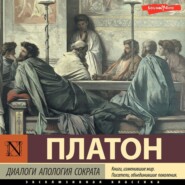По всем вопросам обращайтесь на: info@litportal.ru
(©) 2003-2024.
✖
Phaedo
Настройки чтения
Размер шрифта
Высота строк
Поля
Then we must have known equality previously to the time when we first saw the material equals, and reflected that all these apparent equals strive to attain absolute equality, but fall short of it?
Very true.
And we recognize also that this absolute equality has only been known, and can only be known, through the medium of sight or touch, or of some other of the senses, which are all alike in this respect?
Yes, Socrates, as far as the argument is concerned, one of them is the same as the other.
From the senses then is derived the knowledge that all sensible things aim at an absolute equality of which they fall short?
Yes.
Then before we began to see or hear or perceive in any way, we must have had a knowledge of absolute equality, or we could not have referred to that standard the equals which are derived from the senses? – for to that they all aspire, and of that they fall short.
No other inference can be drawn from the previous statements.
And did we not see and hear and have the use of our other senses as soon as we were born?
Certainly.
Then we must have acquired the knowledge of equality at some previous time?
Yes.
That is to say, before we were born, I suppose?
True.
And if we acquired this knowledge before we were born, and were born having the use of it, then we also knew before we were born and at the instant of birth not only the equal or the greater or the less, but all other ideas; for we are not speaking only of equality, but of beauty, goodness, justice, holiness, and of all which we stamp with the name of essence in the dialectical process, both when we ask and when we answer questions. Of all this we may certainly affirm that we acquired the knowledge before birth?
We may.
But if, after having acquired, we have not forgotten what in each case we acquired, then we must always have come into life having knowledge, and shall always continue to know as long as life lasts – for knowing is the acquiring and retaining knowledge and not forgetting. Is not forgetting, Simmias, just the losing of knowledge?
Quite true, Socrates.
But if the knowledge which we acquired before birth was lost by us at birth, and if afterwards by the use of the senses we recovered what we previously knew, will not the process which we call learning be a recovering of the knowledge which is natural to us, and may not this be rightly termed recollection?
Very true.
So much is clear – that when we perceive something, either by the help of sight, or hearing, or some other sense, from that perception we are able to obtain a notion of some other thing like or unlike which is associated with it but has been forgotten. Whence, as I was saying, one of two alternatives follows: – either we had this knowledge at birth, and continued to know through life; or, after birth, those who are said to learn only remember, and learning is simply recollection.
Yes, that is quite true, Socrates.
And which alternative, Simmias, do you prefer? Had we the knowledge at our birth, or did we recollect the things which we knew previously to our birth?
I cannot decide at the moment.
At any rate you can decide whether he who has knowledge will or will not be able to render an account of his knowledge? What do you say?
Certainly, he will.
But do you think that every man is able to give an account of these very matters about which we are speaking?
Would that they could, Socrates, but I rather fear that to-morrow, at this time, there will no longer be any one alive who is able to give an account of them such as ought to be given.
Then you are not of opinion, Simmias, that all men know these things?
Certainly not.
They are in process of recollecting that which they learned before?
Certainly.
But when did our souls acquire this knowledge? – not since we were born as men?
Certainly not.
And therefore, previously?
Yes.
Then, Simmias, our souls must also have existed without bodies before they were in the form of man, and must have had intelligence.
Unless indeed you suppose, Socrates, that these notions are given us at the very moment of birth; for this is the only time which remains.
Yes, my friend, but if so, when do we lose them? for they are not in us when we are born – that is admitted. Do we lose them at the moment of receiving them, or if not at what other time?
No, Socrates, I perceive that I was unconsciously talking nonsense.
Then may we not say, Simmias, that if, as we are always repeating, there is an absolute beauty, and goodness, and an absolute essence of all things; and if to this, which is now discovered to have existed in our former state, we refer all our sensations, and with this compare them, finding these ideas to be pre-existent and our inborn possession – then our souls must have had a prior existence, but if not, there would be no force in the argument? There is the same proof that these ideas must have existed before we were born, as that our souls existed before we were born; and if not the ideas, then not the souls.
Yes, Socrates; I am convinced that there is precisely the same necessity for the one as for the other; and the argument retreats successfully to the position that the existence of the soul before birth cannot be separated from the existence of the essence of which you speak. For there is nothing which to my mind is so patent as that beauty, goodness, and the other notions of which you were just now speaking, have a most real and absolute existence; and I am satisfied with the proof.
Well, but is Cebes equally satisfied? for I must convince him too.
I think, said Simmias, that Cebes is satisfied: although he is the most incredulous of mortals, yet I believe that he is sufficiently convinced of the existence of the soul before birth. But that after death the soul will continue to exist is not yet proven even to my own satisfaction. I cannot get rid of the feeling of the many to which Cebes was referring – the feeling that when the man dies the soul will be dispersed, and that this may be the extinction of her. For admitting that she may have been born elsewhere, and framed out of other elements, and was in existence before entering the human body, why after having entered in and gone out again may she not herself be destroyed and come to an end?
Very true, Simmias, said Cebes; about half of what was required has been proven; to wit, that our souls existed before we were born: – that the soul will exist after death as well as before birth is the other half of which the proof is still wanting, and has to be supplied; when that is given the demonstration will be complete.
But that proof, Simmias and Cebes, has been already given, said Socrates, if you put the two arguments together – I mean this and the former one, in which we admitted that everything living is born of the dead. For if the soul exists before birth, and in coming to life and being born can be born only from death and dying, must she not after death continue to exist, since she has to be born again? – Surely the proof which you desire has been already furnished. Still I suspect that you and Simmias would be glad to probe the argument further. Like children, you are haunted with a fear that when the soul leaves the body, the wind may really blow her away and scatter her; especially if a man should happen to die in a great storm and not when the sky is calm.
Cebes answered with a smile: Then, Socrates, you must argue us out of our fears – and yet, strictly speaking, they are not our fears, but there is a child within us to whom death is a sort of hobgoblin; him too we must persuade not to be afraid when he is alone in the dark.
Socrates said: Let the voice of the charmer be applied daily until you have charmed away the fear.
And where shall we find a good charmer of our fears, Socrates, when you are gone?
Hellas, he replied, is a large place, Cebes, and has many good men, and there are barbarous races not a few: seek for him among them all, far and wide, sparing neither pains nor money; for there is no better way of spending your money. And you must seek among yourselves too; for you will not find others better able to make the search.

















